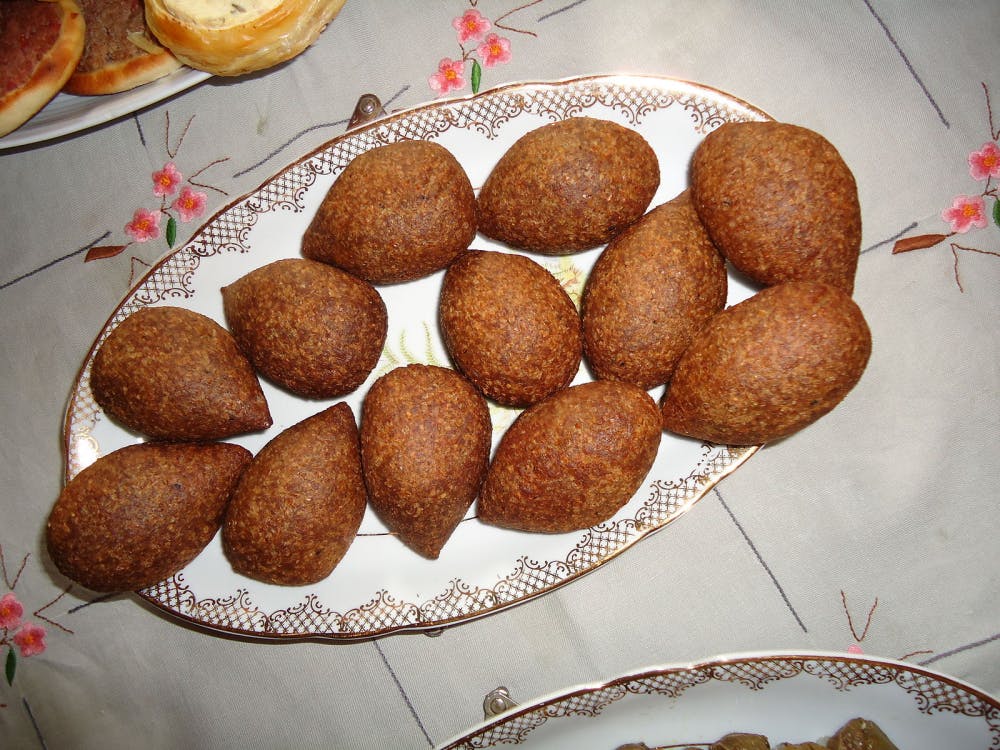This past weekend, the Baltimore Museum of Art (BMA) hosted Mera Kitchen Collective for a special seminar titled “The Stories of Mera Kitchen: Chef Iman in Conversation with Alia Malek.” Mera Kitchen Collective is a worker-owned cooperative that seeks to empower immigrant women through food.
The event featured a reading from Syrian-American journalist Alia Malek, author of the critically acclaimed The Home That Was Our Country: A Memoir of Syria. One of the most notable parts of the reading came when Malek explained the idea that coffee is a symbol of community in Syria. By inverting the cup after finishing the drink inside, her grandmother would read others’ fortunes from the pattern left by silty remains in the bottom. As the practice was traditionally considered haram, or forbidden by Islamic law, she became well known in her local circle of family and friends.
A room filled with a diverse group of people in one of the most divided cities in America listened to the Baltimore-born Malek tell her grandmother’s story.
She went on to mediate and translate a conversation in Arabic with Chef Iman Alshehab of the Mera Kitchen Collective. Iman had cooked in the Four Seasons Hotel in Damascus before fleeing Syria. Antonio Tahhan, a Syrian-Venezuelan-American food blogger, helped interpret. He also commented on his experience as a Fulbright Scholar in Aleppo.
Chef Iman’s parents passed away when she was young, so many of the family responsibilities fell upon her. She quickly took up cooking when she was 13 to help feed the people around her, and she never stopped.
Cooking brings people together, and this sense of Syrian hospitality has always dominated its food culture. Food is a vehicle for expressing one’s love, and variety further shows generosity.
“There is an old Syrian saying: ‘A tiny house can fit a thousand friends,’” Tahhan said.
As Syria’s political situation deteriorated, Iman considered leaving the country. The last straw was a mortar landing in her kitchen, destroying a large portion of the house and giving her six-month-old granddaughter breathing problems. When they took the child to the hospital, another mortar struck, and her granddaughter passed away.
Iman fled to Jordan, expecting to return in a few months. One day, she received a phone call asking if she would like to start a new life in America. All of a sudden, she was on a plane to Baltimore, a city she had never heard of, heading to an unfamiliar territory.
The conversation shifted toward vivid descriptions of tasty Syrian treats like makdous and kibbeh, which vary from region to region. Tahhan gave us a rundown of the difference between Damascene and Aleppine cuisines. As an old Syrian proverb says, “Aleppo is the mother of all stuffed vegetables and kibbeh.”
Iman discussed briefly her experience meeting the others who would eventually form the Collective.
When asked about her part in the Mera Kitchen, she quietly responded, “I am not a part of it. It’s my life. I love them.”
Afterward, there was an introduction to the Roots & Raíces Festival from Valeria Fuentes, a graduate of the Maryland Institute College of Art.
The event concluded with an Eritrean coffee ceremony led by Chef Zaid of Mera. Syrian cookies and tea were set out for guests to enjoy.
Aisha AlFadhalah and Emily Lerman, founding members of Mera Kitchen Collective, elaborated on the organization and its goals in an interview with The News-Letter.
Lerman commented on how the business model is split into two sides: for-profit and non-profit.
“We figured it was the best way to increase representation since we want a worker-owned business [for-profit], but we are also working with populations that have barriers [non-profit],” Lerman said.
The Collective began in June 2017. They started with a few pop-up dinners hosted in homes with friends and have since expanded into restaurant spaces including Hersh’s, Alma Cocina and Clavel.
Their original goal was to empower immigrant women. AlFadhalah explained why they choose to do so through food.
“Cooking brings people together at the table. It’s a universal human experience,” AlFadhalah said. “The greatest treasures are the stories we have shared, and food allows us to open up and share them.”
They hope to continue cooking in a greater variety of places, host even bigger events, and eventually expand into a brick and mortar restaurant space to employ more women and positively impact their families.
There are many unknowns in Mera Kitchen Collective’s future, but they are resolved to continue their work. They hope to break barriers between communities, one delicious bite at a time.
You can catch them at the JFX Farmers’ Market every Sunday from 7 a.m. to 12 p.m. until Dec. 23.





